Publications
Print Publications
The Ronning Centre offers print publications of lectures and essays by distinguished scholars. To order print copies of any of the publications below, please contact the Augustana Bookstore at 780-679-1139, or augbook@ualberta.ca.
Online Publications
A selection of Ronning Centre publications are available online through an open access format. Anyone with internet access is able to view this selection of Ronning Centre publications of lectures and essays by distinguished scholars. To view the PDF or website exhibit, simply click on the publication titles below.
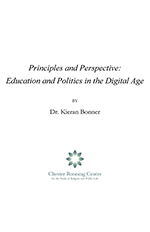
Principles and Perspective: Education and Politics in the Digital Age
Kieran Bonner
This text represents two public lectures that Dr. Kieran Bonner gave in Camrose, Alberta, on October 4, 2016: the first at the University of Alberta's Augustana Campus, and the second at the Camrose Public Library. The text preserves the original tone of the lectures, including introductory comments and follow-up questions and discussion. Where necessary, it has been edited for clarity. Dr. Bonner's visit was supported by the Distinguished Visiting Fellows Endowment Fund and the Hendrickson Family Endowment Fund.
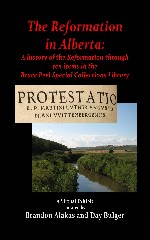
The Reformation in Alberta, A History of the Reformation through Ten Items in the Bruce Peel Special Collections Library
A virtual exhibit curated by Brandon Alakas & Day Bulger.
In marking the 500th anniversary of the Reformation, we have gathered a collection of ten seminal works housed at the Bruce Peel Special Collections Library at the University of Alberta. Each of these books has played an important role in the history of the Reformation. By thinking about them individually, we can more easily recognize the multiple competing voices that contributed to this pan-national debate about belief, salvation, and the role of the institutional church. These books also remind us of the critical role new communications technologies played in sharing emerging ideas and challenging old orthodoxies. As the works in this exhibit demonstrate, print played a fundamental part in driving this international debate.
This virtual library exhibit aims to bring readers closer to events during the Reformation era through the very books that shaped its history. We in Alberta are fortunate to have such a collection of early modern printed works. Although this exhibit offers only a small selection of rare books from this period that belong to the Bruce Peel Library, each work bridges the distance separating us from the Reformation by highlighting the effort and conviction of authors from a variety of perspectives. Each voice is unique and reminds us that reformation was occurring in many ways-among groups who would become known as Protestants, as well as among Roman Catholics-and in many places throughout the sixteenth century.
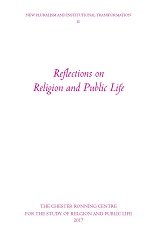
Reflections on Religion and Public Life, New Pluralism and Institutional Transformation Series, 2017.
Edited by Dr. Catherine Caufield (Associate Director, Research, Chester Ronning Centre) with a Foreword by David J. Goa (Founding Director, Chester Ronning Centre).
Based on a colloquium series held at the Chester Ronning Centre for the Study of Religion and Public Life during Winter 2016, Dr. Michel Desjardins (Associate Dean, Research and Curriculum; Professor, Religion and Culture, Wilfrid Laurier University), Dr. Michael Higgins (Vice-President for Mission and Catholic Identity, Professor of Religious Studies, Sacred Heart University), Dr. John von Heyking (Political Science, University of Lethbridge), Ron Nikkel (President Emeritus, Prison Fellowship International), Dr. Joe Mihevc (Councillor, Ward 21, City of Toronto), and Dr. Earle Waugh (Director, Centre for Health and Culture, University of Alberta) offer wide-ranging and nuanced understandings of religion and various aspects of public life, reflecting the depth and breadth of the work of the Centre during its inaugural decade.
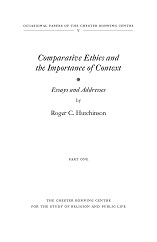
Comparative Ethics and the Importance of Context - Essays and Addresses - Part I (Occasional Papers Series, 2016).
Roger C. Hutchinson
Part I of a follow-up collection complementing Dr. Hutchinson's Ethical Choices in a Pluralistic World (Chester Ronning Centre 2008), focusing on ways in which varying contexts shape approaches to comparative ethics research. Essays include analyses of discussions held by the United Church Council on Justice and Corrections with the Canadian Federal Law Reform Commission, reflection on the Mackenzie Valley pipeline debate, and a paper on paradigm differences and conflicting assumptions about particular contexts; from the latter, he notes "as a comparative ethicist, my aim [...] is to improve our ability to have more disciplined debates about strategies within groups of like-minded individuals, and to have more disciplined public conversations about policies and priorities in societies characterized by resurgent cultural identities on the one hand, and the homogenizing forces of economic globalization and dominant cultures on the other" (76).
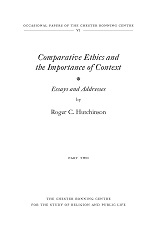
Comparative Ethics and the Importance of Context - Essays and Addresses - Part II (Occasional Papers Series, 2016).
Roger C. Hutchinson
Part II of a follow-up collection complementing Dr. Hutchinson's Ethical Choices in a Pluralistic World (Chester Ronning Centre 2008), focusing on ways in which varying contexts shape approaches to comparative ethics research. Essays include discussion of the relationship between French and English identities, which makes reference to his essay on Aboriginal identity in Ethical Choices in a Pluralistic World, the United Church's reflections on Canada's role in military involvement in conflicts in different parts of the world, discussion of the Parish Nursing movement, and end of life choices in the context of current issues and debates around physician-assisted dying. Reflecting on a career spanning several decades, Dr. Hutchinson reflects: "As my career as a university professor evolved from Christian Ethics to Religious Ethics and finally to Comparative Ethics my constant preoccupation has been with communication, and in particular, attempts at communication involving persons with different identities and life experiences" (38).
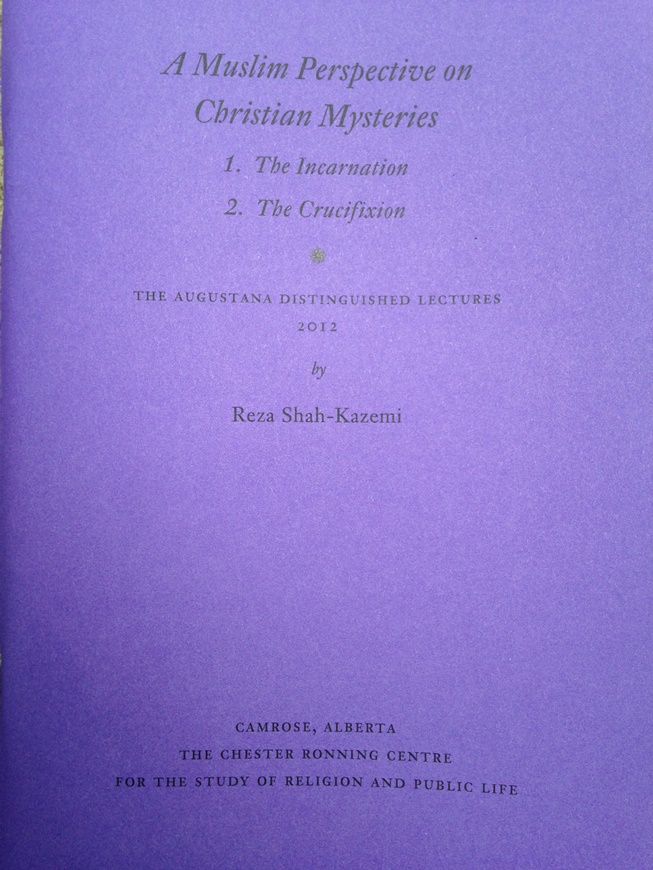
Muslim Perspectives on Christian Mysteries: 1. The Incarnation 2. The Crucifixion
Reza Shah-Kazemi
New and sometimes surprising insights on Muslim-Christian relations were offered by Reza Shah-Kazemi in his Augustana Distinguished Lectures delivered in Camrose and Edmonton in 2012. These lectures reveal how some of the greatest theologians of the Islamic Middle Ages pondered the extensive account of the Virgin Mary included in the Qur'an and the nature of Jesus whom they described as the "Spirit of God", and how the Persian mystic al-Hallaj (d. 922), in particular, found inspiration in the example of Jesus during the events that led to his own execution. While there remain contradictions between the formal theology of Islam and Christianity, on a more profound spiritual level often unrecognized areas of significant agreement can be traced. Dr. Shah-Kazemi, an editor of the Encyclopedia Islamica, is among the leading scholars of the Muslim world to-day.
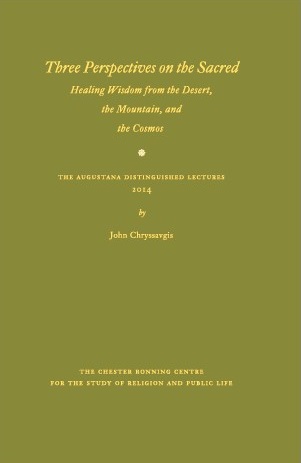
Three Perspectives on the Sacred: Healing Wisdom from the Desert, the Mountains, and the Cosmos
John Chryssavgis
This publication of the Ronning Centre contains the Augustana Distinguished Lectures as given by Fr John Chryssavgis in 2014. Three essays are included: "Healing the Wounded Soul," "Healing a Wounded World," and "Healing a Wounded Planet." Fr Chryssavgis draws on his work with His All-Holiness, Bartholomew, Archbishop of Constantinople-New Rome and Ecumenical Patriarch, who brings theologians, philosophers, scientists, journalists, politicians, and policy specialists together to consider the challenges that flow from our misplaced appetite, our misunderstanding of development, and our rampant consumerism. In the Foreword, Ronning Centre Director David Goa notes that this work "is refreshing, grounded as it is in an understanding that we can turn around from our missteps, that the hope that is a theological virtue and gift from God can lead us to sustained engagement in practices of healing for the life of the world."
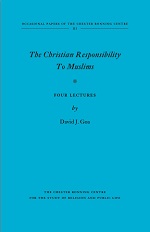
The Christian Responsibility to Muslims
David J. Goa
The first of two new publications of the Chester Ronning Centre addresses an issue of intense current concern: The Christian Responsibility to Muslims. In this booklet, Centre Director David J. Goa shares reflections drawn from his long and varied experience of the ways Muslims and Christians have interacted with each other, often, but not always, ways that have enriched the lives of both. He identifies the basic element of religious hatred and violence as the habit of regarding people simply in terms of stereotyped religious categories, without sensing the need to understand their true motives and convictions without, as he puts it, "seeing their faces". He presents vivid cameos of the generosity and humanity he has encountered in the Muslim community in Alberta; then, starting from the early years when Islam first appeared in the Middle East, he illustrates some different approaches that Christians have taken to living with Muslim authorities. There have been serious efforts at mutual understanding, but also the grim results evident when he visits Kossovo, where Christian and Muslim communities had been deliberately turned away from any recognition of each other. Finally he poses the critical question: What attitudes can Christians express toward Muhammad, the prophet of Islam, that would warm the hearts of Muslims? To this he finds no one simple answer, but offers valuable insights for committed Christians willing to help forge a sense of community in a pluralist country such as Canada is today.
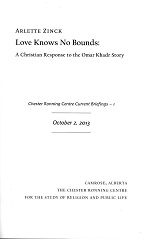
Love Knows No Bounds: A Christian Response to the Omar Khadr Story
Arlette Zinck
In this briefing paper, Arlette Zinck (Professor of English at The King's University), outlines the case of Omar Khadr, a young Canadaian wounded and taken captive by United States Forces as a child soldier in Afghanistan, held under abusive conditions in Guantanamo Bay, then returned, apparently against the wishes of the Canadian government, to this country to serve a sentence imposed after a trial of dubious legality. This is the first of a continuing series of briefs that will deal with immediate and controversial issues involving religion and society.
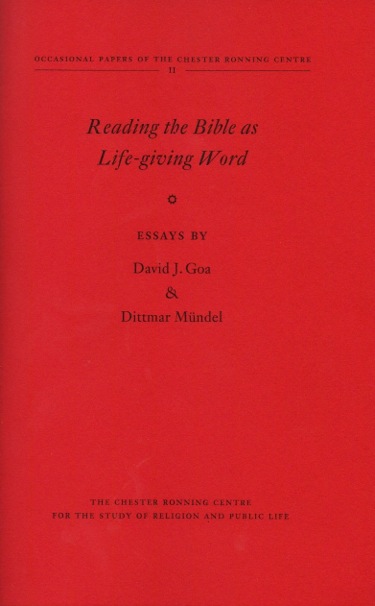
Reading the Bible as Life-Giving Word
David J. Goa and Dittmar Mündel
"To what extent do biblical readings and preaching actually constitute life-giving, life-changing encounters with the Risen and the Triune God? And how might the experiences of worshippers with respect to the biblical readings of Sunday worship become even richer and deeper than at present? . . . Dittmar Mündel names the wide variety of ways in which God communicates with us and says that we encounter God 'clothed in creation' and 'clothed in theWord.' . . . David J. Goa consideres behaviours and ways of thinking that keep the life-giving potential of Scripture from being achieved."
-J. Frank Henderson, from the Prefatory Note
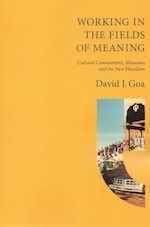
Working in the Fields of Meaning: Cultural Communities, Museums, and the New Pluralism
David J. Goa
"The ultimate concern of virtually every human culture is to tell its children its story," writes David Goa in this text. If that is the case, then ask yourself whether your story has been told or heard or recorded or remembered? As yourself who holds your story? Ask yourself who knows your story? David's work is not only "for the sake of the children." It is for all of us. His text belongs with other contemporary writers who see the necessity, and the hazard, or using story to build bridges between communities-bridges of knowledge, bridges of understanding, bridges of acceptance.
-Eunice Victoria Scarfe, from the Prologue
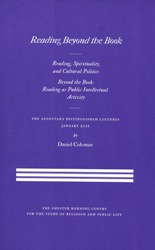
Reading Beyond the Book-Reading, Spirituality, and Cultural Politics and Beyond the Book: Reading as Public Intellectual Activity
Daniel Coleman
Why can the adherents of so many religions be described as "People of the Book"? What can they gain spiritually from their persistent reading - and what are the shortcomings of reading as an aid to spirituality? These are questions addressed with insight and learning by Daniel Coleman, Professor of English at McMaster University, using as examples not only conventional texts but also the "Two Row Wampum" that recorded the relationship between the Haudenosee (Iroquois) and the overseas Dutch in the 17th century. Rightly conducted, he concludes, reading can give us both a new sense of ourselves and broader understanding of the other; the book becomes (in poet Dionne Brand's phrase) "a mirror and an ocean".
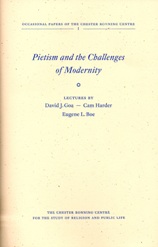
Pietism and the Challenges of Modernity
Lectures by David J. Goa, Cam Harder, and Eugene L. Boe
Hard though it may be to define precisely, Pietism as a religious movement within the Lutheran churches needs to be recognized for the difference it made not only to individual believers but to society as a whole. Here three scholars illuminate diverse aspects of the pietist phenomenon: Eugene L. Boe analyses its early theological tendencies in the context of eighteenth-century Norway, Cam Harder demonstrates the impact of the courageous Pietist Hans Nielsen Hauge on Norwegian society, while David J. Goa draws on his family background as well as extensive field research in a moving evocation of the experience of the immigrants who brought Pietism into a Canadian setting. With this publication the Chester Ronning Centre launches a new series of Occasional Papers to be issued from time to time.
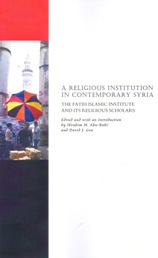
A Religious Institution in Contemporary Syria: The Fatih Islamic Institute and Its Religious Scholars
Edited and with an introduction by Ibrahim M. Abu-Rabi' and David J. Goa
Relations between Muslims and Christians are perhaps the most fraught issue involving religion in public life today. The Fatih Islamic Institute in Damascus, founded half a century ago and led by eminent Muslim scholars, counts among its achievements the education of increasing numbers of students from Syria and many other countries in an authentic understanding of Qur'anic doctrine that enjoins full respect between the faiths. Shaykh Abdul Fattah al-Bizm, Mufti of Damascus, and Shaykh Hussam al-Din Farfour, Vice-rector of the Institute, have delivered notable addresses at Ronning Centre events while visiting Canada. Now, joined by a number of their colleagues and students, they explain key aspects of the meaning of Islam for the present time in a series of succinct and lucid essays. Historical sketches of the institution these scholars direct and first-hand appreciations of its work also appear in the volume, edited by the late Ibrahim M. Abu-Rabi', holder of the ECMC Chair in Islamic Studies at the University of Alberta, and David J. Goa, Director of the Ronning Centre. Readers will gain new insights into Islam's potential as a vital, constructive factor in world societies.
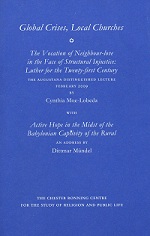
Global Crises, Local Churches: The Vocation of Neighbour-love in the Face of Structural Injustice: Luther for the Twenty-first Century (by Cynthia Moe-Lobeda) and Active Hope in the Midstof the Babylonian Captivity of the Rural (by Dittmar Mündel)
Cynthia Moe-Lobeda and Dittmar Mündel
"Systemic injustice tends to permeate human societies, even while those of us not oppressed by it remain unaware of it." This is the paradoxical situation confronted by Cynthia Moe-Lobeda, sometime theological consultant to the Presiding Bishop of the Evangelical Lutheran Church in America, who draws on her understanding of Martin Luther's concept of neighbour-love and her encounters with Third World hardships to point a way forward. In the same volume, we publish a vigorous defence by Lutheran pastor Dittmar Mündel of the special value of rural communities and how the churches can help to maintain them.
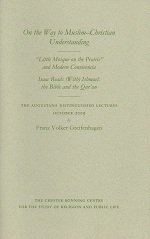
On the Way to Muslim-Christian Understanding: "Little Mosque on the Prairie" and Modern Convivencia, Isaac Reads (With) Ishmael: the Bible and the Qur'an
Franz Volker Greifenhagen
Franz Volker Greifenhagen, Assistant Dean of Luther College in the University of Regina, Saskatchewan, has made a special study of the relations among Judaism, Christianity, and Islam. Here he accompanies the popular-an entertaining analysis of the series of television comedies, "Little Mosque on the Prairie"-with the academic, a careful textual comparison of the way the story of Abraham's near-sacrifice of his son Isaac is narrated in the Bible and the Qur'an, in a way that will contribute to a better understanding by Christians and Muslims of each other's religious ideas and practices.
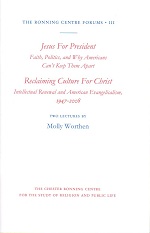
Jesus For President: Faith, Politics, and Why Americans Can't Keep Them Apart; Reclaiming Culture For Christ: Intellectual Renewal and American Evangelicalism, 1947-2008
Molly Worthen
In the first to be published of the Ronning Centre Forums, American journalist Molly Worthen reports on the changes taking place within the United States religious movements commonly described-and often dismissed-as "fundamentalist". Basing her lively presentation on her own observations and interviews, she chronicles the rise of institutions of high intellectual culture within the "fundamentalist" communities, in a way that raises significant questions about their future character and influence.
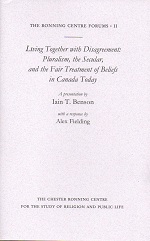
Living Together with Disagreement: Pluralism, the Secular, and the Fair Treatment of Beliefs in Canada Today
Iain T. Benson, with a response by Alex Fielding
Canadian lawyer Iain Benson's career has taken him to Europe and South Africa, but here he returns to his home base to assess the status of religious liberty in Canada as it has been defined by the judges in a series of pivotal court cases. Benson's acute perception and lucid exposition of the underlying assumptions reflected in the court decisions makes the lectures he contributed to the Ronning Centre Forum essential reading not only for legal specialists but for all concerned with the protection of religious freedoms by law.
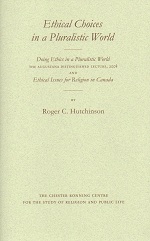
Ethical Choices in a Pluralistic World; Doing Ethics in a Pluralistic World and Ethical Issues for Religion in Canada
Roger C. Hutchinson
Sometime Principal of Emmanuel College and a pioneer in the introduction of Religious Studies to the curriculum of the University of Toronto, Roger C. Hutchinson addresses the implications of the religious pluralism of Canadian society to-day. It does not mean, he argues, relegating religion to the sphere of the private and banishing it from public life. "The public realm", instead, "is, and should be, both shared and contested." He comments judiciously on a series of live issues in Canadian politics where religion offers (sometimes opposed) insights, and in an appendix outlines his method of moderating disagreements between his religiously diverse students.
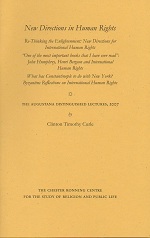
New Directions in Human Rights: Re-Thinking the Enlightenment: New Directions for International Human Rights; "One of the most important books that I have ever read": John Humphrey, Henri Bergson and International Human Rights; What has Constantinople to do with New York? Byzantine Reflections on International Human Rights
Clinton Timothy Curle
Rejecting the three common rationales for human rights-those deriving from the Enlightenment, from Nietzsche, and from Neo-Thomism-Clinton Curle in the Augustana Lectures of 2007 argues for a different view, one envisaging an "absolute" but "open" morality. Sources for this view he finds in the philosophy of Henri Bergson and the theology of the Orthodox Church; and he traces its decisive influence on the thought of the modest, little-recognized but decisively influential Canadian, John Humphrey, drafter of the Universal Declaration of Human Rights adopted by the United Nations in 1948.
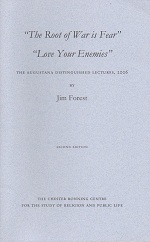
The Root of War is Fear and Love Your Enemies
Jim Forest
In the very first set of Augustana lectures, delivered in 2006, Jim Forest, Secretary of the Orthodox Peace Fellowship, shrewdly analyses the account of the obstacles to peace written by his friend, the American monk Thomas Merton. He comments: "The process of abolishing war is not a task only for politicians and specialists. It involves each of us. It has to do with daily life, how we pray, and what we do-and refuse to do." He adds a description of what the Gospel injunction to love one's enemies must mean in modern times, with their "culture of death" that calls for a response of "lifesaving activity."
OLD FORMATTING HERE:
Online Publications
A selection of Ronning Centre publications are available online through an open access format. Anyone with internet access is able to view this selection of Ronning Centre publications of lectures and essays by distinguished scholars. To view the PDF or website exhibit, simply click on the publication titles below.

Principles and Perspective: Education and Politics in the Digital Age
Kieran Bonner
This text represents two public lectures that Dr. Kieran Bonner gave in Camrose, Alberta, on October 4, 2016: the first at the University of Alberta's Augustana Campus, and the second at the Camrose Public Library. The text preserves the original tone of the lectures, including introductory comments and follow-up questions and discussion. Where necessary, it has been edited for clarity. Dr. Bonner's visit was supported by the Distinguished Visiting Fellows Endowment Fund and the Hendrickson Family Endowment Fund.

The Reformation in Alberta, A History of the Reformation through Ten Items in the Bruce Peel Special Collections Library
A virtual exhibit curated by Brandon Alakas & Day Bulger.
In marking the 500th anniversary of the Reformation, we have gathered a collection of ten seminal works housed at the Bruce Peel Special Collections Library at the University of Alberta. Each of these books has played an important role in the history of the Reformation. By thinking about them individually, we can more easily recognize the multiple competing voices that contributed to this pan-national debate about belief, salvation, and the role of the institutional church. These books also remind us of the critical role new communications technologies played in sharing emerging ideas and challenging old orthodoxies. As the works in this exhibit demonstrate, print played a fundamental part in driving this international debate.
This virtual library exhibit aims to bring readers closer to events during the Reformation era through the very books that shaped its history. We in Alberta are fortunate to have such a collection of early modern printed works. Although this exhibit offers only a small selection of rare books from this period that belong to the Bruce Peel Library, each work bridges the distance separating us from the Reformation by highlighting the effort and conviction of authors from a variety of perspectives. Each voice is unique and reminds us that reformation was occurring in many ways-among groups who would become known as Protestants, as well as among Roman Catholics-and in many places throughout the sixteenth century.

Reflections on Religion and Public Life, New Pluralism and Institutional Transformation Series, 2017.
edited by Dr. Catherine Caufield (Associate Director, Research, Chester Ronning Centre) with a Foreword by David J. Goa (Founding Director, Chester Ronning Centre).
Based on a colloquium series held at the Chester Ronning Centre for the Study of Religion and Public Life during Winter 2016, Dr. Michel Desjardins (Associate Dean, Research and Curriculum; Professor, Religion and Culture, Wilfrid Laurier University), Dr. Michael Higgins (Vice-President for Mission and Catholic Identity, Professor of Religious Studies, Sacred Heart University), Dr. John von Heyking (Political Science, University of Lethbridge), Ron Nikkel (President Emeritus, Prison Fellowship International), Dr. Joe Mihevc (Councillor, Ward 21, City of Toronto), and Dr. Earle Waugh (Director, Centre for Health and Culture, University of Alberta) offer wide-ranging and nuanced understandings of religion and various aspects of public life, reflecting the depth and breadth of the work of the Centre during its inaugural decade.
Comparative Ethics and the Importance of Context - Essays and Addresses - Part I (Occasional Papers Series, 2016).
Roger C. Hutchinson
Part I of a follow-up collection complementing Dr. Hutchinson's Ethical Choices in a Pluralistic World (Chester Ronning Centre 2008), focusing on ways in which varying contexts shape approaches to comparative ethics research. Essays include analyses of discussions held by the United Church Council on Justice and Corrections with the Canadian Federal Law Reform Commission, reflection on the Mackenzie Valley pipeline debate, and a paper on paradigm differences and conflicting assumptions about particular contexts; from the latter, he notes "as a comparative ethicist, my aim [...] is to improve our ability to have more disciplined debates about strategies within groups of like-minded individuals, and to have more disciplined public conversations about policies and priorities in societies characterized by resurgent cultural identities on the one hand, and the homogenizing forces of economic globalization and dominant cultures on the other" (76).

Comparative Ethics and the Importance of Context - Essays and Addresses - Part II (Occasional Papers Series, 2016).
Roger C. Hutchinson
Part II of a follow-up collection complementing Dr. Hutchinson's Ethical Choices in a Pluralistic World (Chester Ronning Centre 2008), focusing on ways in which varying contexts shape approaches to comparative ethics research. Essays include discussion of the relationship between French and English identities, which makes reference to his essay on Aboriginal identity in Ethical Choices in a Pluralistic World, the United Church's reflections on Canada's role in military involvement in conflicts in different parts of the world, discussion of the Parish Nursing movement, and end of life choices in the context of current issues and debates around physician-assisted dying. Reflecting on a career spanning several decades, Dr. Hutchinson reflects: "As my career as a university professor evolved from Christian Ethics to Religious Ethics and finally to Comparative Ethics my constant preoccupation has been with communication, and in particular, attempts at communication involving persons with different identities and life experiences" (38).

Muslim Perspectives on Christian Mysteries: 1. The Incarnation 2. The Crucifixion
Reza Shah-Kazemi
New and sometimes surprising insights on Muslim-Christian relations were offered by Reza Shah-Kazemi in his Augustana Distinguished Lectures delivered in Camrose and Edmonton in 2012. These lectures reveal how some of the greatest theologians of the Islamic Middle Ages pondered the extensive account of the Virgin Mary included in the Qur'an and the nature of Jesus whom they described as the "Spirit of God", and how the Persian mystic al-Hallaj (d. 922), in particular, found inspiration in the example of Jesus during the events that led to his own execution. While there remain contradictions between the formal theology of Islam and Christianity, on a more profound spiritual level often unrecognized areas of significant agreement can be traced. Dr. Shah-Kazemi, an editor of the Encyclopedia Islamica, is among the leading scholars of the Muslim world to-day.

Three Perspectives on the Sacred: Healing Wisdom from the Desert, the Mountains, and the Cosmos
John Chryssavgis
This publication of the Ronning Centre contains the Augustana Distinguished Lectures as given by Fr John Chryssavgis in 2014. Three essays are included: "Healing the Wounded Soul," "Healing a Wounded World," and "Healing a Wounded Planet." Fr Chryssavgis draws on his work with His All-Holiness, Bartholomew, Archbishop of Constantinople-New Rome and Ecumenical Patriarch, who brings theologians, philosophers, scientists, journalists, politicians, and policy specialists together to consider the challenges that flow from our misplaced appetite, our misunderstanding of development, and our rampant consumerism. In the Foreword, Ronning Centre Director David Goa notes that this work "is refreshing, grounded as it is in an understanding that we can turn around from our missteps, that the hope that is a theological virtue and gift from God can lead us to sustained engagement in practices of healing for the life of the world."

The Christian Responsibility to Muslims
David J. Goa
The first of two new publications of the Chester Ronning Centre addresses an issue of intense current concern: The Christian Responsibility to Muslims. In this booklet, Centre Director David J. Goa shares reflections drawn from his long and varied experience of the ways Muslims and Christians have interacted with each other, often, but not always, ways that have enriched the lives of both. He identifies the basic element of religious hatred and violence as the habit of regarding people simply in terms of stereotyped religious categories, without sensing the need to understand their true motives and convictions without, as he puts it, "seeing their faces". He presents vivid cameos of the generosity and humanity he has encountered in the Muslim community in Alberta; then, starting from the early years when Islam first appeared in the Middle East, he illustrates some different approaches that Christians have taken to living with Muslim authorities. There have been serious efforts at mutual understanding, but also the grim results evident when he visits Kossovo, where Christian and Muslim communities had been deliberately turned away from any recognition of each other. Finally he poses the critical question: What attitudes can Christians express toward Muhammad, the prophet of Islam, that would warm the hearts of Muslims? To this he finds no one simple answer, but offers valuable insights for committed Christians willing to help forge a sense of community in a pluralist country such as Canada is today.

Love Knows No Bounds: A Christian Response to the Omar Khadr Story
Arlette Zinck
In this briefing paper, Arlette Zinck (Professor of English at The King's University), outlines the case of Omar Khadr, a young Canadaian wounded and taken captive by United States Forces as a child soldier in Afghanistan, held under abusive conditions in Guantanamo Bay, then returned, apparently against the wishes of the Canadian government, to this country to serve a sentence imposed after a trial of dubious legality. This is the first of a continuing series of briefs that will deal with immediate and controversial issues involving religion and society.

Reading the Bible as Life-Giving Word
David J. Goa and Dittmar Mündel
"To what extent do biblical readings and preaching actually constitute life-giving, life-changing encounters with the Risen and the Triune God? And how might the experiences of worshippers with respect to the biblical readings of Sunday worship become even richer and deeper than at present? . . . Dittmar Mündel names the wide variety of ways in which God communicates with us and says that we encounter God 'clothed in creation' and 'clothed in theWord.' . . . David J. Goa consideres behaviours and ways of thinking that keep the life-giving potential of Scripture from being achieved."
-J. Frank Henderson, from the Prefatory Note

Working in the Fields of Meaning: Cultural Communities, Museums, and the New Pluralism
David J. Goa
"The ultimate concern of virtually every human culture is to tell its children its story," writes David Goa in this text. If that is the case, then ask yourself whether your story has been told or heard or recorded or remembered? As yourself who holds your story? Ask yourself who knows your story? David's work is not only "for the sake of the children." It is for all of us. His text belongs with other contemporary writers who see the necessity, and the hazard, or using story to build bridges between communities-bridges of knowledge, bridges of understanding, bridges of acceptance.
-Eunice Victoria Scarfe, from the Prologue

Reading Beyond the Book-Reading, Spirituality, and Cultural Politics and Beyond the Book: Reading as Public Intellectual Activity
Daniel Coleman
Why can the adherents of so many religions be described as "People of the Book"? What can they gain spiritually from their persistent reading - and what are the shortcomings of reading as an aid to spirituality? These are questions addressed with insight and learning by Daniel Coleman, Professor of English at McMaster University, using as examples not only conventional texts but also the "Two Row Wampum" that recorded the relationship between the Haudenosee (Iroquois) and the overseas Dutch in the 17th century. Rightly conducted, he concludes, reading can give us both a new sense of ourselves and broader understanding of the other; the book becomes (in poet Dionne Brand's phrase) "a mirror and an ocean".

Pietism and the Challenges of Modernity
Lectures by David J. Goa, Cam Harder, and Eugene L. Boe
Hard though it may be to define precisely, Pietism as a religious movement within the Lutheran churches needs to be recognized for the difference it made not only to individual believers but to society as a whole. Here three scholars illuminate diverse aspects of the pietist phenomenon: Eugene L. Boe analyses its early theological tendencies in the context of eighteenth-century Norway, Cam Harder demonstrates the impact of the courageous Pietist Hans Nielsen Hauge on Norwegian society, while David J. Goa draws on his family background as well as extensive field research in a moving evocation of the experience of the immigrants who brought Pietism into a Canadian setting. With this publication the Chester Ronning Centre launches a new series of Occasional Papers to be issued from time to time.

A Religious Institution in Contemporary Syria: The Fatih Islamic Institute and Its Religious Scholars
edited and with an introduction by Ibrahim M. Abu-Rabi' and David J. Goa
Relations between Muslims and Christians are perhaps the most fraught issue involving religion in public life today. The Fatih Islamic Institute in Damascus, founded half a century ago and led by eminent Muslim scholars, counts among its achievements the education of increasing numbers of students from Syria and many other countries in an authentic understanding of Qur'anic doctrine that enjoins full respect between the faiths. Shaykh Abdul Fattah al-Bizm, Mufti of Damascus, and Shaykh Hussam al-Din Farfour, Vice-rector of the Institute, have delivered notable addresses at Ronning Centre events while visiting Canada. Now, joined by a number of their colleagues and students, they explain key aspects of the meaning of Islam for the present time in a series of succinct and lucid essays. Historical sketches of the institution these scholars direct and first-hand appreciations of its work also appear in the volume, edited by the late Ibrahim M. Abu-Rabi', holder of the ECMC Chair in Islamic Studies at the University of Alberta, and David J. Goa, Director of the Ronning Centre. Readers will gain new insights into Islam's potential as a vital, constructive factor in world societies.

Global Crises, Local Churches:The Vocation of Neighbour-love in the Face of Structural Injustice: Luther for the Twenty-first Century by Cynthia Moe-Lobeda withActive Hope in the Midstof the Babylonian Captivity of the Rural by Dittmar Mündel
"Systemic injustice tends to permeate human societies, even while those of us not oppressed by it remain unaware of it." This is the paradoxical situation confronted by Cynthia Moe-Lobeda, sometime theological consultant to the Presiding Bishop of the Evangelical Lutheran Church in America, who draws on her understanding of Martin Luther's concept of neighbour-love and her encounters with Third World hardships to point a way forward. In the same volume, we publish a vigorous defence by Lutheran pastor Dittmar Mündel of the special value of rural communities and how the churches can help to maintain them.

Franz Volker Greifenhagen
Franz Volker Greifenhagen, Assistant Dean of Luther College in the University of Regina, Saskatchewan, has made a special study of the relations among Judaism, Christianity, and Islam. Here he accompanies the popular-an entertaining analysis of the series of television comedies, "Little Mosque on the Prairie"-with the academic, a careful textual comparison of the way the story of Abraham's near-sacrifice of his son Isaac is narrated in the Bible and the Qur'an, in a way that will contribute to a better understanding by Christians and Muslims of each other's religious ideas and practices.

Jesus For President: Faith, Politics, and Why Americans Can't Keep Them Apart; Reclaiming Culture For Christ: Intellectual Renewal and American Evangelicalism, 1947-2008
Molly Worthen
In the first to be published of the Ronning Centre Forums, American journalist Molly Worthen reports on the changes taking place within the United States religious movements commonly described-and often dismissed-as "fundamentalist". Basing her lively presentation on her own observations and interviews, she chronicles the rise of institutions of high intellectual culture within the "fundamentalist" communities, in a way that raises significant questions about their future character and influence.
Iain T. Benson, with a response by Alex Fielding
Canadian lawyer Iain Benson's career has taken him to Europe and South Africa, but here he returns to his home base to assess the status of religious liberty in Canada as it has been defined by the judges in a series of pivotal court cases. Benson's acute perception and lucid exposition of the underlying assumptions reflected in the court decisions makes the lectures he contributed to the Ronning Centre Forum essential reading not only for legal specialists but for all concerned with the protection of religious freedoms by law.

Ethical Choices in a Pluralistic World; Doing Ethics in a Pluralistic World andEthical Issues for Religion in Canada
Roger C. Hutchinson
Sometime Principal of Emmanuel College and a pioneer in the introduction of Religious Studies to the curriculum of the University of Toronto, Roger C. Hutchinson addresses the implications of the religious pluralism of Canadian society to-day. It does not mean, he argues, relegating religion to the sphere of the private and banishing it from public life. "The public realm", instead, "is, and should be, both shared and contested." He comments judiciously on a series of live issues in Canadian politics where religion offers (sometimes opposed) insights, and in an appendix outlines his method of moderating disagreements between his religiously diverse students.

Clinton Timothy Curle
Rejecting the three common rationales for human rights-those deriving from the Enlightenment, from Nietzsche, and from Neo-Thomism-Clinton Curle in the Augustana Lectures of 2007 argues for a different view, one envisaging an "absolute" but "open" morality. Sources for this view he finds in the philosophy of Henri Bergson and the theology of the Orthodox Church; and he traces its decisive influence on the thought of the modest, little-recognized but decisively influential Canadian, John Humphrey, drafter of the Universal Declaration of Human Rights adopted by the United Nations in 1948.

The Root of War is Fear and Love Your Enemies
Jim Forest
In the very first set of Augustana lectures, delivered in 2006, Jim Forest, Secretary of the Orthodox Peace Fellowship, shrewdly analyses the account of the obstacles to peace written by his friend, the American monk Thomas Merton. He comments: "The process of abolishing war is not a task only for politicians and specialists. It involves each of us. It has to do with daily life, how we pray, and what we do-and refuse to do." He adds a description of what the Gospel injunction to love one's enemies must mean in modern times, with their "culture of death" that calls for a response of "lifesaving activity."